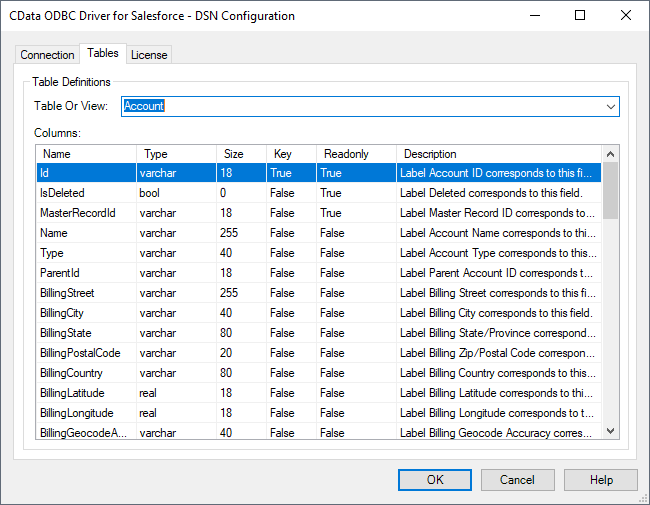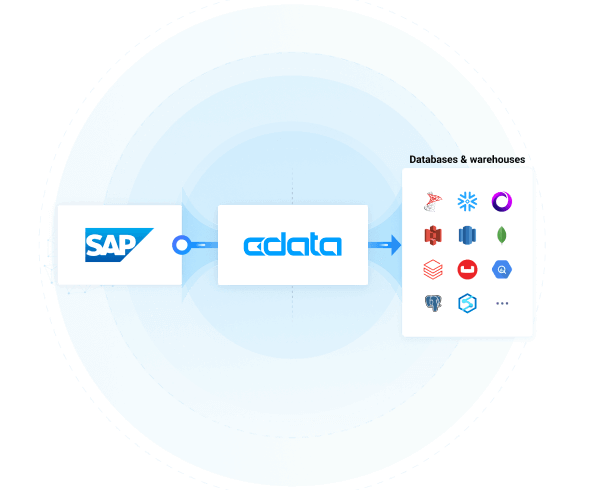Discover how a bimodal integration strategy can address the major data management challenges facing your organization today.
Get the Report →How to connect PolyBase to Aha
Use CData drivers and PolyBase to create an external data source in SQL Server 2019 with access to live Aha data.
PolyBase for SQL Server allows you to query external data by using the same Transact-SQL syntax used to query a database table. When paired with the CData API Driver for ODBC, you get access to your Aha data directly alongside your SQL Server data. This article describes creating an external data source and external tables to grant access to live Aha data using T-SQL queries.
NOTE: PolyBase is only available on SQL Server 19 and above, and only for Standard SQL Server.
The CData ODBC drivers offer unmatched performance for interacting with live Aha data using PolyBase due to optimized data processing built into the driver. When you issue complex SQL queries from SQL Server to Aha, the driver pushes down supported SQL operations, like filters and aggregations, directly to Aha and utilizes the embedded SQL engine to process unsupported operations (often SQL functions and JOIN operations) client-side. And with PolyBase, you can also join SQL Server data with Aha data, using a single query to pull data from distributed sources.
Connect to Aha
If you have not already, first specify connection properties in an ODBC DSN (data source name). This is the last step of the driver installation. You can use the Microsoft ODBC Data Source Administrator to create and configure ODBC DSNs. To create an external data source in SQL Server using PolyBase, configure a System DSN (CData Aha Sys is created automatically).
Start by setting the Profile connection property to the location of the Aha! Profile on disk (e.g. C:\profiles\aha.apip). Next, set the ProfileSettings connection property to the connection string for Aha! (see below).
Aha! API Profile Settings
The Aha! API uses OAuth-based authentication.
You will first need to register an OAuth app with Aha!. This can be done from your Aha! account under 'Settings' > 'Personal' > 'Developer' > 'OAuth Applications'. Additionally, you will need to set the Domain, found in the domain name of your Aha account. For example if your Aha account is acmeinc.aha.io, then the Domain should be 'acmeinc'.
After setting the following in the connection string, you are ready to connect:
- AuthScheme: Set this to OAuth.
- InitiateOAuth: Set this to GETANDREFRESH. You can use InitiateOAuth to manage the process to obtain the OAuthAccessToken.
- OAuthClientId: Set this to the client_id that is specified in you app settings.
- OAuthClientSecret: Set this to the client_secret that is specified in you app settings.
- CallbackURL: Set this to the Redirect URI you specified in your app settings.
- Domain: Set this in the ProfileSettings to your Aha domain.
Click "Test Connection" to ensure that the DSN is connected to Aha properly. Navigate to the Tables tab to review the table definitions for Aha.
Create an External Data Source for Aha Data
After configuring the connection, you need to create a master encryption key and a credential database for the external data source.
Creating a Master Encryption Key
Execute the following SQL command to create a new master key, 'ENCRYPTION,' to encrypt the credentials for the external data source.
CREATE MASTER KEY ENCRYPTION BY PASSWORD = 'password';
Creating a Credential Database
Execute the following SQL command to create credentials for the external data source connected to Aha data.
NOTE: Since Aha does not require a User or Password to authenticate, you may use whatever values you wish for IDENTITY and SECRET.
CREATE DATABASE SCOPED CREDENTIAL api_creds WITH IDENTITY = 'username', SECRET = 'password';
Create an External Data Source for Aha
Execute a CREATE EXTERNAL DATA SOURCE SQL command to create an external data source for Aha with PolyBase:
- Set the LOCATION parameter , using the DSN and credentials configured earlier.
For Aha, set SERVERNAME to the URL or address for your server (e.g. 'localhost' or '127.0.0.1' for local servers; the remote URL for remote servers). Leave PORT empty. PUSHDOWN is set to ON by default, meaning the ODBC Driver can leverage server-side processing for complex queries.
CREATE EXTERNAL DATA SOURCE cdata_api_source WITH ( LOCATION = 'odbc://SERVER_URL', CONNECTION_OPTIONS = 'DSN=CData Aha Sys', -- PUSHDOWN = ON | OFF, CREDENTIAL = api_creds );
Create External Tables for Aha
After creating the external data source, use CREATE EXTERNAL TABLE statements to link to Aha data from your SQL Server instance. The table column definitions must match those exposed by the CData API Driver for ODBC. You can refer to the Tables tab of the DSN Configuration Wizard to see the table definition.

Sample CREATE TABLE Statement
The statement to create an external table based on a Aha Ideas would look similar to the following:
CREATE EXTERNAL TABLE Ideas( Id [nvarchar](255) NULL, Name [nvarchar](255) NULL, ... ) WITH ( LOCATION='Ideas', DATA_SOURCE=cdata_api_source );
Having created external tables for Aha in your SQL Server instance, you are now able to query local and remote data simultaneously. Thanks to built-in query processing in the CData ODBC Driver, you know that as much query processing as possible is being pushed to Aha, freeing up local resources and computing power. Download a free, 30-day trial of the ODBC Driver for Aha and start working with live Aha data alongside your SQL Server data today.





